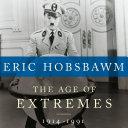“Human beings are not efficiently designed for a capitalist system of production.”
Source: The Age of Extremes (1992), p. 414.

The Age of Extremes: The Short Twentieth Century, 1914–1991 is a book by Eric Hobsbawm, published in 1994. In it, Hobsbawm comments on what he sees as the disastrous failures of state socialism, capitalism, and nationalism; he offers an equally skeptical take on the progress of the arts and changes in society in the latter half of the twentieth century.
“Human beings are not efficiently designed for a capitalist system of production.”
Source: The Age of Extremes (1992), p. 414.
“The paradox of communism in power was that it was conservative.”
Source: The Age of Extremes (1992), p. 422.
Source: The Age of Extremes (1992), Chapter Eleven, Cultural Revolution, p.338-339
Context: The old moral vocabulary of rights and duties, mutual obligations, sin and virtue, sacrifice, conscience, rewards, and penalties, could no longer be translated into the new language of desired gratification. Once such practices and institutions were no longer accepted as part of a way of ordering society that linked people to each other and ensured social cooperation and reproduction, most of their capacity to structure human social life vanished. They were reduced simply expressions of individuals' preferences, and claims that the law should recognize the supremacy of these preferences. Uncertainty and unpredictability impended. Compass needles no longer had a North, maps became useless.
Introduction
The Age of Extremes (1992)
Context: My object is to understand ad explain why things turned out the way they did, and how they hang together. For anyone of my age-group who has lived through all or most of the Short Twentieth Century this is inevitably also a autobiographical endeavor. We are talking about, amplifying (and correcting) our own memories. And we are talking as men and women of a particular time and place, involved, in various ways, in its history as actors in its dramas - however insignificant our parts - as observers of our times and, not least, as people whose views of the century have been formed by what we have come to see as its crucial events.